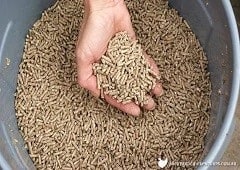 There are a few different types of chicken feed that you can purchase for your poultry. You can feed your birds either layer, scratch, or starter. Learn about each type of feed, as well as their different nutritional needs. Whether you’re looking to increase your flock’s eggs production or feed your chickens for egg-laying, you’ll find the best food options for your needs below. We recommend using chicken mash for the youngest of your flock, since it’s smaller and easier to digest for them.
There are a few different types of chicken feed that you can purchase for your poultry. You can feed your birds either layer, scratch, or starter. Learn about each type of feed, as well as their different nutritional needs. Whether you’re looking to increase your flock’s eggs production or feed your chickens for egg-laying, you’ll find the best food options for your needs below. We recommend using chicken mash for the youngest of your flock, since it’s smaller and easier to digest for them.
Contents
Starter feed
A good starter chicken feed is essential for your laying hens, as they change from chicks to pullets in a short time. This feed contains essential nutrients for bone health and immunity, as well as vitamins and minerals. You should feed it for the first eight weeks of life, until you switch to grower chicken feed. Starter chicken feed should contain a balanced diet, including vitamins, minerals, and omega-3 fatty acids.
Most starter chicken feed is fortified with probiotics, a type of bacteria that promotes healthy bacteria in the chicken’s digestive tract. These beneficial bacteria allow the chickens to process and absorb food more efficiently, which can save you money. However, it’s important to remember that you should never feed antibiotics to young meat birds. If you have already vaccinated your chicks, you may choose to avoid medicated starter feeds.
Layer feed
You can get two types of chicken feed – medicated and unmedicated. The decision to use medicated feed depends on the chicken’s vaccination status. Grower feed is designed for six to twenty-week-old pullets. It contains 16 to 18% protein, lower calcium, and other ingredients that support continued growth of teenage chooks. This type of feed is also suitable for laying hens.
There are several types of layer feed available for purchase. One of the most popular is Purina Layena + Omega 3, which comes in a 10 or 40-pound bag. Kaytee Laying Hen Diet is another good option, with extra calcium to promote stronger eggshells and vitamins and minerals. Layena + is a good choice for layers because it contains marigold extract for brighter yolks.
Scratch
While scratch isn’t the healthiest choice for chickens, it is a natural supplement that provides them with important vitamins and minerals. Without adequate nutrition, chickens will not be as energetic as you’d like them to be and may even become lethargic during hot weather. Scratch is an easy-to-use supplement that is available at most pet stores. However, commercial scratch is only available at farm-and-fleet stores and is comparatively less nutritious than homemade scratch.
Scratch contains a mixture of cracked grains. Traditionally, farmers would use scraps from harvesting to make scratch. Typically, scratch is made with wheat, corn, oats, sunflower seeds, and millet. In addition, scratch does not provide complete nutrition for chickens. Because scratch contains small pieces of grains, it can be indigestible to chickens. Commercial chicken feed contains vitamins, minerals, and binders.
Grower feed
Grower chicken feed is a great way to give your pullets a proper start in life. Unlike starter feed, grower chicken food has less protein but contains enough to produce playful pullets. Grower feed is not medicated and is available in pellet form. Some chicks may have difficulty transitioning from starter feed to pellets, but breaking down the pellets into smaller pieces will help. Growing chickens also need adequate calcium and vitamin A to stay healthy and strong.
When deciding on what to feed your grower flock, it is important to consider the protein and mineral content of the food. Layers need more calcium than growers. Generalized flock feed can also lead to eggs with a thin shell, wrinkled shell, or yolk. Some feeds are made especially for growers, while others are better suited for layers. There are many brands of grower chicken feed available, so be sure to find one that suits your specific needs.
Flock raiser
When it comes to choosing chicken feed, the options are almost unlimited. There are pellets, crumbles, and oatmeal. Pellets have a finer texture, making them easier for chicks to handle. Crumples are more similar to oatmeal than cereal. And oats are a fine, tiny piece of feed. The yum factor is a measure of how much a chicken likes a particular feed and how easy it is for them to eat it.
A layer chicken feed contains the right combination of protein, calcium, vitamins, and minerals for egg-laying. This type of feed is best for non-specialty flocks. Broiler and layer chickens should get specialized feed once they reach maturity. Flock raiser is best for non-specialized flocks like broilers. However, it is still an option for those with mixed flocks. This type of feed is formulated to help the birds lay more eggs.



